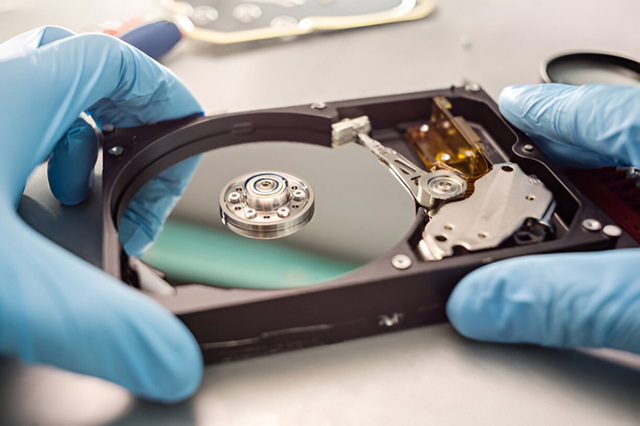When your computer reaches the end of its useful life, choosing a professional hard drive disposal service becomes far more critical than most people realise. The assumption that deleted files disappear forever represents perhaps the most dangerous misconception in our digital age. Behind the familiar comfort of the desktop recycle bin lies a more complex reality, one that demands serious consideration before that old machine finds its way to a skip or charity shop.
The conventional approach to disposing of computers involves little more than a factory reset and a hope that sensitive information remains buried. This complacency, however, ignores the sophisticated methods available to anyone with modest technical knowledge and the right software. Data recovery specialists routinely resurrect files from drives that users believed had been wiped clean, revealing everything from personal photographs to business correspondence, financial records to private communications.
Understanding the True Nature of Digital Deletion
Modern operating systems create an elaborate illusion when files are deleted. What appears to be erasure is merely the removal of a file’s address in the system’s directory. The actual data remains intact on the storage medium, waiting to be overwritten by new information, a process that may never occur, particularly on drives with ample free space.
Professional HDD disposal services understand this fundamental reality and employ methods designed to address it comprehensively. Unlike the superficial deletion performed by standard software, these secure hard drive disposal services utilise specialised techniques that render data genuinely irretrievable.
The Singapore Standard: A Model Approach
Singapore’s approach to secure data destruction offers valuable insights into best practices. The city-state’s regulations emphasise that “hard disk drives must be physically destroyed or shredded before disposal or reuse” and mandate that “HDD destruction should always be performed by a professional service provider that specialises in secure destruction.”
The framework established by Singapore’s National Environment Agency demonstrates how proper oversight ensures both data security and environmental responsibility. Local providers must obtain proper licensing and follow strict protocols, creating a system where “data or the product has been 100% destroyed” through verified processes.
Methods of Secure Destruction
Professional hard disk disposal services employ several distinct approaches, each designed for specific circumstances:
• Physical Shredding: Industrial shredders reduce drives to particles small enough to prevent any possibility of data reconstruction
• Degaussing: Powerful electromagnetic fields disrupt the magnetic data storage, rendering information permanently unreadable
• Multi-pass Overwriting: Specialised software repeatedly overwrites data using random patterns, ensuring original information cannot be recovered
• Incineration: Complete thermal destruction of the storage medium, though this method raises environmental concerns
The choice of method depends on the sensitivity of the data, regulatory requirements, and environmental considerations. Singapore’s regulatory framework notes that “certified destruction companies follow industry standards, making sure your data is disposed of safely and properly.”
The Hidden Costs of Inadequate Disposal
The financial implications of improper data disposal extend far beyond the cost of professional services. Data breaches resulting from inadequately destroyed drives can trigger regulatory fines, legal action, and reputational damage that persists for years. The General Data Protection Regulation and similar legislation worldwide impose significant penalties on organisations that fail to protect personal information adequately.
Small businesses often assume they face minimal risk, but this calculation ignores the reality that criminals specifically target organisations with weaker security measures. A single compromised drive containing customer information, employee records, or financial data can trigger obligations that prove far more expensive than preventive measures.
Environmental Responsibility in the Digital Age
Beyond data security concerns lies the equally important question of environmental impact. Electronic waste represents one of the fastest-growing waste streams globally, with hard drives containing valuable materials that can be recovered and reused when properly processed.
Responsible e-waste disposal companies ensure that destroyed drives undergo proper recycling, with “materials recovery and responsible disposal” forming essential components of their secure data destruction services. This approach aligns with Singapore’s SS 587 standard, which provides “guidelines to manage the equipment in environmentally responsible ways when they reach their end-of-life.”
Selecting Appropriate Services
The proliferation of providers claiming to offer secure destruction has created a landscape where credentials matter enormously. Legitimate providers maintain certifications from recognised bodies and provide detailed documentation of their processes. They offer certificates of destruction that specify the methods used and confirm compliance with relevant standards.
Organisations should seek providers that maintain:
• Current licensing from environmental authorities
• Compliance with international data destruction standards
• Insurance coverage for data handling
• Transparent pricing without hidden fees
• Detailed reporting of the destruction process
The Verification Process
Professional services distinguish themselves through comprehensive documentation and verification procedures. Reputable providers offer detailed certificates that specify exactly what was destroyed, when, and by which method. Some services include photographic evidence or video documentation of the destruction process, providing additional assurance that sensitive information has been properly handled.
This documentation serves multiple purposes: demonstrating compliance with regulatory requirements, providing evidence for insurance claims if necessary, and offering peace of mind to organisations concerned about their data security obligations.
Moving Beyond Complacency
The digital age has created unprecedented risks that require more sophisticated responses than previous generations faced. The assumption that personal computers contain nothing of value overlooks the reality that modern devices store enormous quantities of information, much of it potentially valuable to criminals or competitors.
Professional destruction services represent not an additional expense, but essential protection against risks that continue growing as our dependence on digital storage increases. The modest cost of proper disposal pales in comparison to the potential consequences of inadequate measures.
The path forward requires abandoning assumptions about digital security that were never accurate and embracing approaches that acknowledge the true persistence of electronic information. In an interconnected world where data breaches make headlines daily, the decision to engage a professional service represents not paranoia but prudence, making a reliable hard drive disposal service an indispensable component of responsible data management.

